V-RED: Recognizing Excellence in Diagnosis
What is V-RED?
One of the greatest challenges a patient with vasculitis faces is receiving a definitive diagnosis. Patients can spend months or even years seeking a diagnosis, or worse, living with a misdiagnosis and ineffective treatment. The V-RED award honors healthcare professionals who make the diagnosis of vasculitis.
Karen Hirsch created the award program after her son, Michael, was diagnosed with granulomatosis with polyangiitis (GPA) in 2011 by Juanita Mora, MD, an allergist/immunologist at the Chicago Allergy Center. Dr. Mora’s quick diagnosis helped Michael receive timely treatment, which helped lead to his remission.

2024 NOMINATIONS
The Vasculitis Foundation (VF) recognizes that there are many health care professionals who have made the diagnosis of vasculitis, and we want to honor them for their efforts to care for our patients.
The 2024 nomination period is closed. The 2025 nomination period will open in August of 2025.
The 2024 awardees will be announced in November 2024.
2023 V-RED Winners
It’s been a year of surprises for our Vasculitis Recognizing Excellence in Diagnosis (V-RED) award program. We have two winners who tied for first place, two winners who received honorable mentions, and this is the first year we’ve had a winner from Germany and Saskatoon, Canada.
This is the 10th year that the VF has called upon patients from around the globe to nominate a medical professional they want to recognize for making a critical, early diagnosis of vasculitis. And in 2023, we continue to honor them for their efforts to care for our patients.
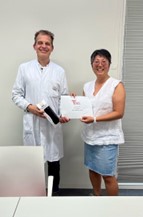
Prof. Dr. Med. Bernd Turowski
Tied for First Place Winner
Department of Diagnostic and Interventional Radiology
Düsseldorf University Hospital
Lindo Terry Spencer Jr., MD
Tied for First Place Winner
Pediatric Pulmonologist,
Providence, Rhode Island
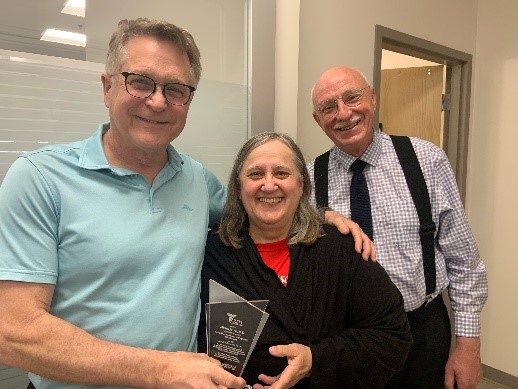
Past Honorees
In the over 10 years that we have honored excellence in diagnosis, we have been inspired by many amazing medical professionals. We know you will be inspired as well as you read the stories of some of our recent past honorees.
 First Place Winner: Muhammad Azeem Aslam, MBBS, FCPS
First Place Winner: Muhammad Azeem Aslam, MBBS, FCPS
Shifa International Hospitals Ltd., Islamabad, Pakistan
Many vasculitis patients run into delays in receiving a diagnosis but we know that “earlier the better” is a key in getting effective treatment. For 32-year-old Muhammad Umar, he was one of the lucky ones. Back in mid-September 2021, Muhammad experienced a range of symptoms—from a cough, difficulty breathing, “strawberry” gums (swollen and resembling over-ripe fruit), and night sweats to ear blockage and pain, a runny nose, nasal bleeding, and pain throughout his entire body.
Umar scheduled an appointment in late September with Dr. Muhammad Azeem Aslam—an ear, nose and throat specialist. After a physical exam, Dr. Aslam told Muhammad that in his opinion he was suffering from granulomatosis with polyangiitis- or GPA – (formerly Wegener’s granulomatosis). Muhammad was then referred to Dr. Aslam’s colleague, rheumatologist Dr. Zaffar Ullah, who recommended tests that included a chest x-ray, computerized tomography (CT) scan, blood ceruloplasmin (CP) test, urine test, and an antineutrophil cytoplasmic antibody (C-ANCA) and perinuclear (P-ANCA) test of Muhammad’s blood.
The test results confirmed Dr. Aslam’s belief that Muhammad had GPA. “He was 100 percent right. My C-ANCA report was strongly positive (100) and all other test results fully supported his opinion,” Muhammad said. “He told me that I am the luckiest person because I was diagnosed with GPA at a very early stage – in three weeks!” Muhammad lives in Haripur Hazara, a city in Pakistan.
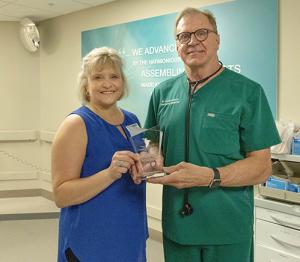 First Place Winner: James S. Komara, DO
First Place Winner: James S. Komara, DO
Mayo Clinic ER, Phoenix, Arizona
For a year before meeting rheumatologist Dr. Alicia Rodriguez-Pla at Mayo Clinic in Arizona, 54-year-old Sarah Jones was repeatedly told by numerous doctors that she had COVID. Sixteen tests later she knew that it wasn’t COVID even though she had similar symptoms: pneumonia, coughing up brown mucus, fever, loss of taste, and fatigue.
A pulmonologist told her it was gastroesophageal reflux disease and that she needed stomach surgery. An allergist said her recurring pneumonia and bronchitis were a result of allergies; her sudden onset of hypertension (220/110) was dismissed as nervousness, and recurring hives were written off as stress. Sarah’s mother, a nurse who specialized in pulmonary diseases, thought the hives should be biopsied but Sarah said that no one was willing to do that and she felt that no one was listening to her.
Out of desperation, Sarah drove to Mayo’s ER in Phoenix. She had 8”-10” hives, a cough, and shortness of breath so severe she couldn’t talk. “Dr. James Komara, the ER physician, was the first person to really listen to me,” Sarah explained. “He saw a human desperate to understand what was happening and not just an emotional female. This was the first time I felt seen and taken seriously.” Dr. Komara diagnosed pneumonia, flagged the blood eosinophils, injected steroids for the hives, and Sarah was admitted. Mayo culture-tested every system in Sarah’s body and ordered a skin biopsy, during which, eosinophils were found.
“I’m not yet in remission but I’m in good hands with my Mayo team,” Sarah said, setting her on a path to navigate this lifelong journey. Sarah lives in Tucson, Arizona, with her wife, Pam, and their two cats.
 Honorable Mention: Richard Craft, MD
Honorable Mention: Richard Craft, MD
Cascade Physicians, Portland, OR
The Ablemans were attending a family reunion when Kacey Ableman’s 13-year-old son, Spencer, started feeling sick. Earlier in the day, the family had been doing short hikes in Yellowstone National Park but by the afternoon, Spencer stayed in the car and napped. He was feeling extremely fatigued, which progressed throughout the day. Later in the evening, Kacey’s dad, Dr. Richard Craft, noticed that Spencer didn’t look too good. “When my dad checked him out, he found the symptoms concerning (rapid heart rate, pale skin), which prompted him to check Spencer’s oxygen saturation (02 sat),” Kacey said. “Both his lungs sounded poorly through his stethoscope.” Dr. Craft, who specializes in internal medicine, immediately got everyone into the car and headed to the nearest hospital.
An hour later, Spencer was checked into the ER at Madison Memorial Hospital in Rexburg, Idaho. His O2 sat had dropped to 60 percent. If he had gone to bed with it that low and it continued to drop, he likely would have died. “My dad’s observations and quick actions saved his life,” Kacey said. It turns out that Spencer was experiencing a life-threatening pulmonary hemorrhage (bleeding into the lungs), which was discovered and treated very quickly after he was life-flighted to a larger hospital—Primary Children’s Hospital in Salt Lake City, Utah. A few days later, Spencer was diagnosed with anti-glomerular basement membrane disease (formerly Goodpasture’s syndrome) and microscopic polyangiitis.
“During all this time my dad was also one of the first to suspect vasculitis,” Kacey explained. “He continually asked about Spencer’s kidney function, which turned out to be the key piece of information the ICU doctors needed to get us a consult with nephrology and rheumatology.” Dr. Craft saved many lives in the course of his career, but this time, he saved his grandson. Kacey and her family live in Maple Grove, Minnesota.
 First Place Winner: Adam Maass, MD
First Place Winner: Adam Maass, MD
Endocrinology, Cave Springs, Arkansas
For then 17-year-old Hunter Keen, it started with coughing on day one. By day two, there was some light blood coming up with the cough. At the time, it was a little more than a week before Christmas in 2017 and the Keen family’s primary care physician (PCP) was away for the holidays. The Keen family, who live in Rogers, Arkansas, were referred to their PCP’s nurse practitioner who diagnosed Hunter with bronchitis and prescribed an antibiotic Z-Pak.
Three days later, the cough grew more intense with dark, bright blood in the sputum. The Keen’s PCP was still unavailable so Hunter’s mom, Sherri, called her son’s endocrinologist, Adam Maass, MD, who had been taking care of Hunter since he was diagnosed at age 12 with type 1 diabetes. Dr. Maass was also away but he recommended that Hunter go for an x-ray of his lungs and lab tests, and stressed that he would place the order himself if the PCP was reluctant to do so.
At the next day’s PCP appointment, a different nurse practitioner told Sherri that Hunter’s lungs sounded good and were clear. “She refused to order the labs and an x-ray until I told her that Dr. Maass, our endocrinologist, would order them,” Sherri explained. The x-ray was taken and an hour later the Keens were told that Hunter had pneumonia in both lungs. He was given another medication that seemed to slow down the coughing, only to have it come back with a vengeance four days later with small blood clots. Sherri took Hunter to see another doctor who immediately sent them to the ER. The ER doctor suspected tuberculosis, called for an ambulance, and Hunter was rushed to the state’s children’s hospital.
Hunter spent five days in the hospital undergoing various tests. The Keens almost lost him twice. The pediatric rheumatologist ordered testing for GPA. Sherri believes that if it hadn’t been for Dr. Maass demanding tests early on, Hunter could have easily been misdiagnosed with pneumonia and died. “We will be forever grateful for Dr. Maass’ close scrutiny and concern for our son’s health.”
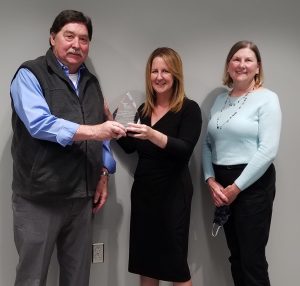 Honorable Mention: Alison Whitman, MD
Honorable Mention: Alison Whitman, MD
Primary Care Medicine, Abingdon, Virginia
Pam Breeding’s husband, Tom, had a sinus infection that treatment did not improve—even after he sought care from an ear, nose, and throat specialist. Tom’s PCP, Alison Whitman, MD, had a growing suspicion that GPA could be the reason for his lingering symptoms.
From mid-June through July 2020, Dr. Whitman ordered tests, made referrals, and continued to voice her unconfirmed, yet ultimately correct diagnosis of GPA. “She was familiar with this rare disease as she already had more than one patient in her practice with it,” Pam explained. “She knew what was needed to receive the definitive diagnosis—a biopsy and anti-neutrophil cytoplasmic antibody testing.”
Pam and Tom, who live in Cleveland, Virginia, thank Dr. Whitman for her knowledge, sensitivity, investigative skills, and persistence, and Dr. Whitman continues to be involved with Tom’s treatment. “Our locality is rural, so travel is necessary for care with specialists and treatments, but Dr. Whitman and the rheumatologist work well together to give Tom excellent care.”
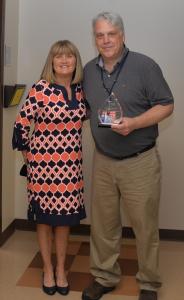 Honorable Mention: Scott Beegle, MD
Honorable Mention: Scott Beegle, MD
Pulmonary and Critical Care Medicine, Albany Medical Center, Albany, New York
Mary Meliski of Stillwater, New York, has been a patient of Scott Beegle, MD, since 2009. Dr. Beegle is a pulmonary/critical care physician in Albany, New York. When Mary was admitted to the hospital in February 2009 with severe jaw, ear, neck and back pain, as well as wheezing and shortness of breath, a month went by with no doctor being able to make a diagnosis. “At one point, my previous PCP told me all my results were normal, that I must be depressed, and that it could all be in my head,” Mary said.
Dr. Beegle’s team performed a lung biopsy on Mary. When the results came back, they found the antibodies, and the lung biopsy was consistent with eosinophilic granulomatosis with polyangiitis (formerly Churg-Strauss syndrome). Mary was finally released in March 2009 with an answer—her illness was not all in her head. “Since the beginning, Dr. Beegle has been dedicated to my care and has a bedside manner unmatched by other providers. His knowledge and understanding assure me that my care is in the right hands.”
 First Place Winner: Gerald Farnell, MD
First Place Winner: Gerald Farnell, MD
Internal Medicine, Keizer, Oregon
Kimberly Meirose was experiencing ongoing symptoms for some time with skin lesions, along with flu-like symptoms and swollen lymph nodes. Her previous provider treated her multiple times with the same medications but her symptoms never resolved. She went to see her family physician, Dr. Gerald Farnell, at the Salem Clinic at Inland Shores in Keizer, Oregon. Dr. Farnell reviewed her previous treatments and lab work. He was concerned about possible Behçets disease as a diagnosis and scheduled an appointment for her with his colleague, Patricia Morrison, MD, at the Salem Clinic. A biopsy was consistent with the diagnosis of Behçets. Kimberly started Imuran®, high doses of prednisone and was then referred to a rheumatologist. “I was very scared but Dr. Farnell explained that since we now knew what was really happening, we could treat it and I’d start feeling better. It was very comforting,” Kimberly said.
First Place Winner: Sue Houx, FNP-C
Family Medicine, Ventura, California
Sue Houx, FNP-C, had known her patient, Eric Hermann, for years and was familiar with his medical history and recent treatment of an earache, which turned out to be an early sign of his disease. Sue, a family nurse practitioner at the Primary Medical Group in Ventura, California, quickly made the diagnosis of Eric’s GPA in 2018 through blood work, with the help of her colleague, Becky Wades, MD. Eric was referred to Tanaz A. Kermani, MD, a rheumatologist at UCLA Health and was initially put on prednisone and Bactrim. He has since undergone Rituxan® treatments to minimize his flare-ups. “I feel I’m doing incredibly well thanks to Sue, Dr. Kermani and my supportive family,” Eric said. “I thank them all for their dedication to the VF Foundation.”
 Honorable Mention: Daniel Jones, MD
Honorable Mention: Daniel Jones, MD
Neurology, Arlington, Ohio
For Elijah Elbert, it was thought he was just a 7-year-old with behavior challenges who needed therapy. Elijah’s doctor referred him to neurologist Daniel Jones, MD, of Arlington, Ohio, who suspected something else. An electroencephalogram showed spikes in the electrical signals in Elijah’s brain, which led to the diagnosis of a seizure disorder. But Dr. Jones didn’t stop there—he ordered two antibody tests—both of which were positive. “At the time, Dr. Jones diagnosed Elijah with central nervous system vasculitis secondary to lupus,” Elijah’s mom, Myranda Elbert, said. Dr. Jones started him on oral prednisone and he improved immediately.
“Dr. Jones has been amazing and is giving our son a chance at life. We were losing him and I had no one who would listen to me until we met Dr. Jones.”
In addition to the tied winners and honorable mention, all medical providers who were nominated will receive a certificate of appreciation from their nominee.
 Berlin, Vermont, Pediatrician Ties for First Place in Vasculitis Foundation’s 2019 V-RED Award Program
Berlin, Vermont, Pediatrician Ties for First Place in Vasculitis Foundation’s 2019 V-RED Award Program
The program has grown into a powerful campaign that raises awareness about early diagnosis.
(Berlin, Vermont, October 2019) Gwendolyn Shelton, MD, shared first place honors in the Vasculitis Foundation’s (VF’s) 2019 Recognizing Excellence in Diagnostics (V-RED) award program. With her diagnosis, doctors started treatment early enough to prevent a young woman’s vasculitis from progressing and causing more systemic damage.
In March of 2008, during her freshman year in high school, Meaghan Carpenter began exhibiting peripheral neuropathy in her legs, in addition to chronic asthma and allergy issues that didn’t appear to have any common thread. Eventually, Carpenter’s pain grew worse and she was admitted to the pediatric ward at Presbyterian Hospital in Albuquerque, New Mexico. Doctors controlled her pain with morphine, but they were unable to pinpoint the diagnosis. Fortunately, Dr. Shelton, who was a pediatric hospitalist on her medical team, felt that Carpenter’s case needed more in-depth investigation. When none of the potential diagnoses in the hospital’s computer produced any leads, Dr. Shelton turned to the internet for clues with more success. A website suggested Churg-Strauss syndrome, now called eosinophilic granulomatosis with polyangiitis.
Dr. Shelton contacted one of her former residency supervisors, Wilmer Sibbitt, MD, for advice (he later became Carpenter’s first rheumatologist). Dr. Sibbitt agreed with her conclusions, and with Dr. Shelton’s diagnosis, the doctors at Presbyterian Hospital began treatment. “Dr. Shelton looked outside the box, took my case home with her and saved me years of potential misdiagnosis,” said Carpenter. “Thanks to her investigation, my disease was identified and brought under control. I’ve been able to live an almost normal life. I’ll never forget what she did for me.”
Currently a pediatrician at Central Vermont Medical Center in Berlin, Dr. Shelton earned her medical degree at the University of Vermont Larner College of Medicine and completed her pediatric residency at the University of New Mexico. She served as a pediatric hospitalist at Presbyterian Hospital in Albuquerque and was founder/director, Inpatient Child Advocacy, responsible for consultations, and civil and criminal testimony for hospitalized children suffering abuse or neglect. Dr. Shelton is a member of the American Academy of Pediatrics.
Karen Hirsch, past-president of the VF Board of Directors, is particularly encouraged by the V-RED award program’s success. After her son, Michael, received an early diagnosis of vasculitis, Hirsch created the award to bring special recognition to medical professionals in a broad range of clinical specialties. She believes the award increases awareness among medical peers. The program calls on patients worldwide to nominate a medical professional they want to recognize for making a critical, early diagnosis of vasculitis, thus enabling timely treatment, and potentially sparing permanent and ongoing health complications. With more nominations than ever before, the program, now in its sixth year, has grown into a powerful campaign that raises awareness about early diagnosis.
Building upon the collective strength of the vasculitis community, the Vasculitis Foundation supports, inspires and empowers individuals with vasculitis and their families through a wide range of education, research, clinical, and awareness initiatives.
 Maitland, Florida, Internist/Anesthesiologist Ties for First Place in Vasculitis Foundation’s 2019 V-RED Award Program
Maitland, Florida, Internist/Anesthesiologist Ties for First Place in Vasculitis Foundation’s 2019 V-RED Award Program
(Maitland, Florida, October 2019) Mark Anderson, MD, shared first place honors in the Vasculitis Foundation’s (VF’s) 2019 Recognizing Excellence in Diagnostics (V-RED) award program. Dr. Anderson’s patient, his wife Nancy Anderson, was trying to get a diagnosis in a way that is familiar to many vasculitis patients. Nancy’s early, nonspecific symptoms led to multiple visits with specialists who misdiagnosed the underlying condition. As her condition worsened, Dr. Anderson was determined to get some answers. “When Nancy’s peripheral neuropathy (numbness and tingling) spread from her feet to her hands, I knew this was something very serious,” he said. “I also knew her doctors were missing the core issue when they suggested it was just arthritis or fatigue.”
Fortunately, Dr. Anderson had some knowledge of vasculitis from his background in internal medicine so he knew what lab tests needed to be ordered for Nancy. When her anti-neutrophil cytoplasmic antibodies test came back significantly elevated, they immediately contacted John Stone, MD, a vasculitis specialist at Massachusetts General Hospital, Boston, where Nancy was diagnosed with microscopic polyangiitis and treated with rituximab (Rituxan®). “I feel so fortunate that my husband intervened when all of my other doctors were misdiagnosing, or not taking my condition seriously,” said Nancy. “His research and gut instinct ultimately prevented the vasculitis from becoming worse.”
Dr. Anderson earned his medical degree from the Geisel School of Medicine at Dartmouth College. He is an internal medicine specialist and anesthesiologist with United States Anesthesia Partners in Maitland, Florida, and has been practicing for more than 30 years. His professional memberships include the American Medical Association, American College of Physicians, American Society of Anesthesiologists, the Florida Society of Anesthesiologists and the Florida Medical Association.
Karen Hirsch, past-president of the VF Board of Directors, is particularly encouraged by the V-RED award program’s success. After her son, Michael, received an early diagnosis of vasculitis, Hirsch created the award to bring special recognition to medical professionals in a broad range of clinical specialties. She believes the award increases awareness among medical peers. The program calls on patients worldwide to nominate a medical professional they want to recognize for making a critical, early diagnosis of vasculitis, thus enabling timely treatment, and potentially sparing permanent and ongoing health complications. With more nominations than ever before, the program, now in its sixth year, has grown into a powerful campaign that raises awareness about early diagnosis.
Building upon the collective strength of the vasculitis community, the Vasculitis Foundation supports, inspires and empowers individuals with vasculitis and their families through a wide range of education, research, clinical, and awareness initiatives.
 Kent Town, Australia, Neurologist Receives Honorable Mention in Vasculitis Foundation’s 2019 V-RED Award Program
Kent Town, Australia, Neurologist Receives Honorable Mention in Vasculitis Foundation’s 2019 V-RED Award Program
(Kent Town, Australia, September 2019) Andrew Lee, MBBS, MPH, FRACP, A/Prof, has received an honorable mention in the Vasculitis Foundation’s (VF’s) 2019 Recognizing Excellence in Diagnostics (V-RED) award program. Dr. Lee, a neurologist in Kent Town, is credited with diagnosing cerebral vasculitis in a patient whose series of frequent strokes baffled her doctors. His patient, Carmen Haule Reaiche, is now enjoying a life free from harsh medications and debilitating symptoms.
“Early diagnosis made a difference to my life in many ways,” said Reaiche. “It allowed me to grow stronger and to recover. “I am back to work, and even though I am not at 100 percent, I am alive. I am also able to be here for my only daughter when she has needed me the most, as she lost her father to cancer. I am functioning the best I can.” Raeiche’s first stroke occurred in 2012 at age 42. When she awoke, she was unable to speak or walk. She was examined by specialists at a local hospital, but after a few days, was released. Several strokes followed and her doctors had no idea why they were happening with such frequency and to someone who usually would not be at risk.
Dr. Lee is director of the Centre for Neuroscience Innovation at Calvary Wakefield Hospital and associate professor, College of Medicine and Public Health, at Flinders University. He specializes in stroke neurology and provides consultations, nerve conduction studies and research trials. He has been in practice for 22 years.
Karen Hirsch, past-president of the VF Board of Directors, is particularly encouraged by the V-RED award program’s success. After her son, Michael, received an early diagnosis of vasculitis, Hirsch created the award to bring special recognition to medical professionals in a broad range of clinical specialties. She believes the award increases awareness among medical peers. The program calls on patients worldwide to nominate a medical professional they want to recognize for making a critical, early diagnosis of vasculitis, thus enabling timely treatment, and potentially sparing permanent and ongoing health complications. With more nominations than ever before, the program, now in its sixth year, has grown into a powerful campaign that raises awareness about early diagnosis. This year, two winners tied for first place in addition to Dr. Lee’s honorable mention.
Building upon the collective strength of the vasculitis community, the Vasculitis Foundation supports, inspires and empowers individuals with vasculitis and their families through a wide range of education, research, clinical, and awareness initiatives.
2018
First Place Winner: Linda Brady, MD Pediatrician, Old Harding Pediatric Associates, Vanderbilt University Medical Center/Monroe Carrell Jr. Children’s Hospital, Nashville, Tennessee
Honorable Mention: Samir Parikh, MD Ohio State Wexner Medical Center – Nephrology, Columbus, Ohio
Honorable Mention: Daniel Watson, MD Park Nicollet St. Louis Park Clinic, St. Louis Park, Minnesota
2017
First Place Winner: Jennifer L. Nansteel, MD Main Line Health Internist, MLHC Primary Care, Wynnewood, Pennsylvania
2016
First Place Winner: Seth Sullivan, MD Clinical Educator/Hospitalist at Norwalk Hospital, Norwalk, Connecticut
First Place Winner: Kate Kinney, ACNP
Monroe Clinic Hospital, Monroe, Wisconsin
First Place Winner:Jeffrey Raines, MD Obstetric/Gynecology Department of Fairview Medical Group Fairview Medical Center, Maple Grove, Minnesota
2015
First Place Winner: Sarah Durney, MD Powell Valley Healthcare in Powell, Wyoming
First Place Winner: Milan Shah, MD Ophthalmologist at Midwest Eye Institute in Indianapolis, Indiana
2014
First Place Winner: Robert Torrano, MD Allergy and Asthma Associates of Northern California

